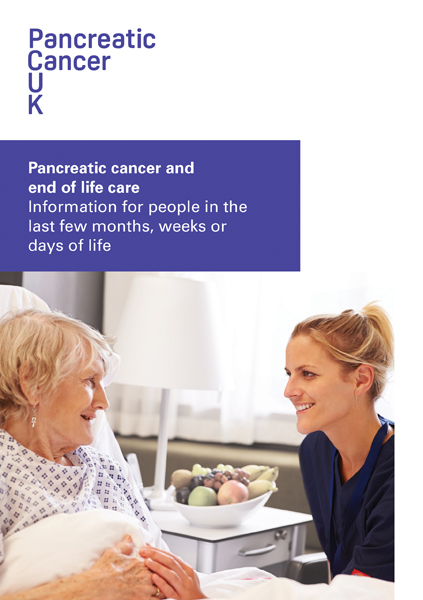Read our booklet about end of life care
To read more about end of life care, download our booklet, Pancreatic cancer and end of life care: information for people in the last months, weeks and days of life.
You can also order a physical copy.
People often ask how they will know that someone is in the last few days of their life. People with pancreatic cancer can become ill very quickly over a few days, and you may not get much warning that the end is near.
It can be hard to cope with this uncertainty but the doctor or nurse can tell you if they think your family member is close to the end of their life. They can explain what signs to look out for and answer any questions you have.
In the final few weeks, you may notice your family member starts to gradually withdraw from the world. They may speak less than usual, be more tired and sleep more. In the final few days, they may stop speaking, although this doesn’t mean they won’t speak again.
Another sign that someone is in the last few days of life is sleepiness. The person may spend lots of time sleeping or they may slip in and out of consciousness. Even if they are unconscious, they may still be able to hear you speaking to them. It can be comforting to both of you to keep talking to them or to hold their hand.
“A friend of mine had a brainwave and appeared at the hospice with a CD player and some of my partner’s favourite CDs. We listened to the Beatles as he died. I’m sure he could hear too and would have approved.”
It is natural for people to stop eating and drinking in the last days of life. You can help your family member stay comfortable by giving them sips of water or small pieces of ice to suck, to keep their mouth moist. If they’re not awake, the GP or nurse can give you swabs to keep their mouth and lips clean and comfortable. Lip balm or moisturisers can help stop their lips and mouth getting dry.
Your family member’s breathing may become slower, shallower or less regular in the last few days. Fluid in the throat or chest may cause breathing to become noisy, or have a rattling sound. This isn’t usually uncomfortable and they may not be aware that it is happening, but it can be upsetting for family or friends. If it is distressing your loved one, the doctor or nurse may try moving them into a different position. They can also use medicines to help reduce it.
Sometimes a person may become confused, restless or agitated. Your loved one may not know where they are or who is with them. Or they may fidget, or want to move about even if they’re not able to. You may want to reassure them by reminding them of who you are and what is going on around them.
They may describe speaking to someone who has died or they may see things that aren’t there. If they’re not upset, it’s fine to talk to them about what they can see or hear. Some people may be frightened – staying near them, gently touching them and reassuring them may help. A calm room with quiet music and familiar items like photos nearby can also help.
It can be upsetting for you if your family member is confused or agitated. There could be different reasons for why it is happening, so speak to the doctor or nurse. They will look for anything that is causing it, like pain, problems with their bladder or bowels, or issues with their medicines. They may recommend giving medicine to relax and calm them. Or they may suggest putting in a catheter (a tube into the bladder to drain urine). This will stop the bladder getting full and causing discomfort. If you are worried that your family member may be in pain, the doctor or nurse can help with this.
“My partner became very confused towards the end of his life. For me that was possibly one of the most upsetting things, seeing someone who had been so strong and capable being so vulnerable. The healthcare team were great though. The doctors, nurse and the paramedics were kind and patient with him.”
Towards the end, your family member’s skin may become blue, grey or pale. Their hands, feet, arms and legs may feel cold. Layers of clothes or bedding can help keep them comfortable.
There is a small risk of bleeding towards the end of life. This is rare but it can be upsetting and frightening, so you may want to be aware that it can happen to a very small number of people. In pancreatic cancer, there may be bleeding internally from the stomach or around the pancreas, and people can sometimes vomit blood. If this happens at home, contact your GP, specialist nurse or hospice team or call the out of hours number you have been given. Stay with your family member and try to reassure them. Using dark towels and sheets may help to make it look less frightening.
In the last few days, the doctor may talk to you about stopping medicines that are no longer needed or that aren’t helping to control symptoms. They may also suggest giving medicines in a different way – for example, by injection or a syringe driver if your family member can no longer swallow medicines.
To read more about end of life care, download our booklet, Pancreatic cancer and end of life care: information for people in the last months, weeks and days of life.
You can also order a physical copy.

If you have questions about what to expect, ask the doctors and nurses.
You can also speak to our specialist nurses on our free Support Line.

Published April 2021
Review date April 2024